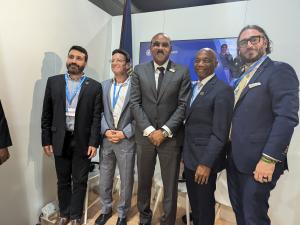BAKU, AZERBAIJAN, November 21, 2024 /EINPresswire.com/ — At COP29, PVBLIC Foundation hosted a pivotal panel discussion titled How Can the Center of Excellence Assist Small Island Developing States (SIDS) in Building Climate Resilience Through Technology, Data, Financing, and Partnerships with the DBRP. Moderated by Mr. Sergio Fernandez De Cordova, Executive Chairman of PVBLIC Foundation, the panel featured high-level speakers including Hon. Gaston Browne, Prime Minister of Antigua and Barbuda; Dr. Gene Leon, Executive Director of the Development Bank for Resilient Prosperity; Mr. Howard Makler, CEO and Founder of Innovation Refund; and Dr. Menon Vin, CEO and Co-Founder of Aquae Impact.
The panel focused on the transformative impact of data and technology in advancing sustainable development goals (SDGs) and supporting climate resilience efforts, particularly for Small Island Developing States (SIDS). The SIDS Center of Excellence, based in Antigua and Barbuda, was highlighted as a hub for innovation, knowledge sharing, and training, specifically tailored to bolster the socio-economic and environmental resilience of SIDS.
“We must break down the complex pathways to international funding and establish clear, accessible routes for SIDS to receive the financial support they need,” said Hon. Gaston Browne, Prime Minister of Antigua and Barbuda. “The upcoming New Collective Quantified Goal on climate finance presents an opportunity for us to set a new standard, and Antigua and Barbuda, through the Center of Excellence, is ready to lead this effort.”
The panel outlined the four pillars of the SIDS Center of Excellence, each designed to empower SIDS through data-driven strategies and technological innovation:
• The SIDS Global Data Hub: This hub provides access to essential data sources, tools, and technologies, enabling informed decision-making for climate resilience and disaster preparedness.
• The Technology and Innovation Mechanism: Supports SIDS in building technological capacity and developing innovative policy solutions that drive sustainable development.
• The Island Investment Forum: Facilitates strategic partnerships and investment in sustainable projects, encouraging socio-economic resilience.
• The Debt Sustainability Support Service: Offers tools to manage debt vulnerability, aiding SIDS in achieving long-term debt sustainability through innovative financing options.
The panel underscored the essential role of private sector partnerships in supporting climate resilience across SIDS. By collaborating with technology companies, SIDS can leverage advanced data analytics, AI solutions, and cloud platforms to enhance the SIDS Global Data Hub. These partnerships enable SIDS to make data-driven decisions, improve disaster risk management, and build capacity for long-term sustainability.
“By collaborating with private sector innovators, we bring cutting-edge technology to the communities that need it most,” stated Sergio Fernandez De Cordova. “These partnerships are vital for building resilient systems that can withstand climate threats and contribute to long-term development goals.”
The panel concluded with a call to action, emphasizing the need for sustained cooperation between governments, development banks, and the private sector to scale innovative solutions for climate resilience. As climate challenges intensify, partnerships with institutions like the DBRP and the Center of Excellence will be essential in enabling SIDS to secure a sustainable, climate-resilient future.
During the first week of COP29, PVBLIC Foundation also hosted a side event focused on the SIDS Global Data Hub at the SDG Pavilion. Stephen Keppel, President, PVBLIC Foundation, presented the progress and impact of the prototype Data Hub launched in May 2024 at the SIDS4 Conference and participated in a panel discussion with Dr Ruth Kattumuri, Senior Director, Economic,Youth & Sustainable Development Directorate, Commonwealth Secretariat and Dr Ritu Bharadwaj, Director, Climate Resilience, Finance and Loss & Damage at the International Institute for Environment and Development (IIED). The panel discussed the importance of data as a tool for resilience, leveraging technology for development, discussing the potential of geospatial and Earth observation data in addressing unique SIDS challenges, creating partnerships for impact, bridging the digital divide and innovative financing for data projects.
Barbara Gonzalez
PVBLIC Foundation
barbara@pvblic.org
Visit us on social media:
X
LinkedIn
Instagram
YouTube
Legal Disclaimer:
EIN Presswire provides this news content “as is” without warranty of any kind. We do not accept any responsibility or liability
for the accuracy, content, images, videos, licenses, completeness, legality, or reliability of the information contained in this
article. If you have any complaints or copyright issues related to this article, kindly contact the author above.
![]()






